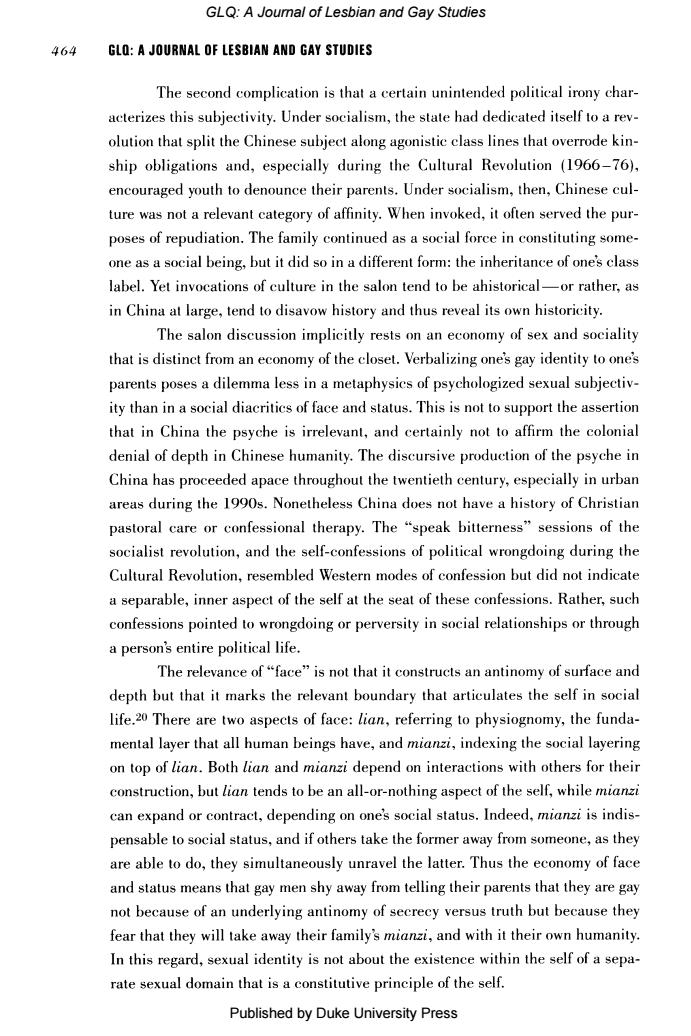正在加载图片...

GLQ:A Joumal of Lesbian and Gay Studies 464 GLQ:A JOURNAL OF LESBIAN AND GAY STUDIES The second complication is that a certain unintended political irony char- acterizes this subjectivity.Under socialism,the state had dedicated itself to a rev- olution that split the Chinese subject along agonistic class lines that overrode kin- ship obligations and,especially during the Cultural Revolution (1966-76), encouraged youth to denounce their parents.Under socialism,then,Chinese cul- ture was not a relevant category of affinity.When invoked,it often served the pur- poses of repudiation.The family continued as a social force in constituting some- one as a social being,but it did so in a different form:the inheritance of one's class label.Yet invocations of culture in the salon tend to be ahistorical-or rather,as in China at large,tend to disavow history and thus reveal its own historicity. The salon discussion implicitly rests on an economy of sex and sociality that is distinct from an economy of the closet.Verbalizing one's gay identity to one's parents poses a dilemma less in a metaphysics of psychologized sexual subjectiv- ity than in a social diacritics of face and status.This is not to support the assertion that in China the psyche is irrelevant,and certainly not to affirm the colonial denial of depth in Chinese humanity.The discursive production of the psyche in China has proceeded apace throughout the twentieth century,especially in urban areas during the 1990s.Nonetheless China does not have a history of Christian pastoral care or confessional therapy.The "speak bitterness"sessions of the socialist revolution,and the self-confessions of political wrongdoing during the Cultural Revolution,resembled Western modes of confession but did not indicate a separable,inner aspect of the self at the seat of these confessions.Rather,such confessions pointed to wrongdoing or perversity in social relationships or through a person's entire political life. The relevance of"face"is not that it constructs an antinomy of surface and depth but that it marks the relevant boundary that articulates the self in social life.20 There are two aspects of face:lian,referring to physiognomy,the funda- mental layer that all human beings have,and mianzi,indexing the social layering on top of lian.Both lian and mianzi depend on interactions with others for their construction,but lian tends to be an all-or-nothing aspect of the self,while mianzi can expand or contract,depending on one's social status.Indeed,mianzi is indis- pensable to social status,and if others take the former away from someone,as they are able to do,they simultaneously unravel the latter.Thus the economy of face and status means that gay men shy away from telling their parents that they are gay not because of an underlying antinomy of secrecy versus truth but because they fear that they will take away their family's mianzi,and with it their own humanity. In this regard,sexual identity is not about the existence within the self of a sepa- rate sexual domain that is a constitutive principle of the self. Published by Duke University Press464 GLQ: A JOURNAL OF LESBIAN AND GAY STUDIES The second complication is that a certain unintended political irony characterizes this subjectivity. Under socialism, the state had dedicated itself to a revolution that split the Chinese subject along agonistic class lines that overrode kinship obligations and, especially during the Cultural Revolution (1966-76), encouraged youth to denounce their parents. Under socialism, then, Chinese culture was not a relevant category of affinity. When invoked, it often served the purposes of repudiation. The family continued as a social force in constituting someone as a social being, but it did so in a different form: the inheritance of one’s class label. Yet invocations of culture in the salon tend to be ahistorical-or rather, as in China at large, tend to disavow history and thus reveal its own historicity. The salon discussion implicitly rests on an economy of sex and sociality that is distinct from an economy of the closet. Verbalizing one’s gay identity to one’s parents poses a dilemma less in a metaphysics of psychologized sexual subjectivity than in a social diacritics of face and status. This is not to support the assertion that in China the psyche is irrelevant, and certainly not to affirm the colonial denial of depth in Chinese humanity. The discursive production of the psyche in China has proceeded apace throughout the twentieth century, especially in urban areas during the 1990s. Nonetheless China does not have a history of Christian pastoral care or confessional therapy. The “speak bitterness” sessions of the socialist revolution, and the self-confessions of political wrongdoing during the Cultural Revolution, resembled Western modes of confession but did not indicate a separable, inner aspect of the self at the seat of these confessions. Rather, such confessions pointed to wrongdoing or perversity in social relationships or through a person’s entire political life. The relevance of “face” is not that it constructs an antinomy of surface and depth but that it marks the relevant boundary that articulates the self in social life.20 There are two aspects of face: lian, referring to physiognomy, the fundamental layer that all human beings have, and mianzi, indexing the social layering on top of Zian. Both lian and mianzi depend on interactions with others for their construction, but lian tends to be an all-or-nothing aspect of the self, while mianzi can expand or contract, depending on one’s social status. Indeed, mianzi is indispensable to social status, and if others take the former away from someone, as they are able to do, they simultaneously unravel the latter. Thus the economy of face and status means that gay men shy away from telling their parents that they are gay not because of an underlying antinomy of secrecy versus truth but because they fear that they will take away their family’s mianzi, and with it their own humanity. In this regard, sexual identity is not about the existence within the self of a separate sexual domain that is a constitutive principle of the self. GLQ: A Journal of Lesbian and Gay Studies Published by Duke University Press